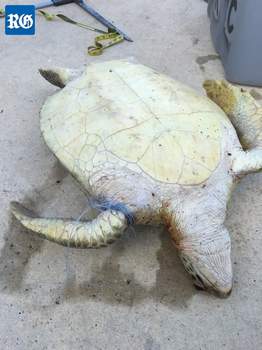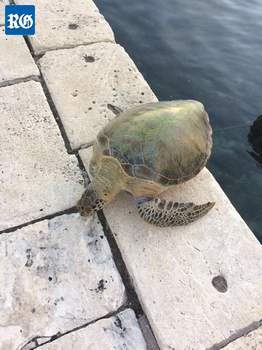Recent News
4 Foot, 2 Inch Squid Washes Up On South ShoreFriday, March 27, 2015
[Updated] A four foot, two inch squid washed up on the South Shore today [Mar 27], with the specimen now on its way to the Aquarium for analysis.
HSBC fund to aid water conservation
Monday, March 23, 2015
The Global HSBC Water Programme has received funding to support two conservation projects in Bermuda.
Waging war on Island’s lionfish menace
Friday, March 20, 2015
A full-time, deep sea culling programme to help to control the number of invasive lionfish is being created by the Ocean Support Foundation.
Tracking the epic journey of sea turtles
Friday, March 13, 2015
New data about Bermuda’s sea turtles, including research tracing the journey of young animals from Bermuda to foreign shores, is to be presented at an upcoming talk.
Educational Opportunities Aboard Endurance
Friday, February 27, 2015
From exploring the surface, to diving beneath the ocean waves, a voyage aboard the Endurance brings with it a multitude of raw emotions that can embolden the most fearful, inspire the most discouraged, and impassion the most indifferent.
About
GovernanceAbout Us
Newsletter
Latest News
Gift & Bookstore
Contact
General Inquiries
info@bzs.bm
Latest News
All the latest updates and news from the Bermuda Aquarium, Museum, and Zoo, one of Bermuda's leading visitor attractions!
Simon Jones
Published Nov 12, 2017 at 12:07 pm (Updated Nov 15, 2017 at 5:28 am)

Animal welfare experts have urged the public to act quickly and call the aquarium if they see signs of a turtle in distress.
The call came after a young green turtle died in the waters off Lagoon Park, in Sandys, after it got entangled in monofilament line attached to a boat mooring.
The animal had been seen circling the mooring by local residents two days earlier, but no one had realised it was trapped.
A concerned citizen contacted Patrick Talbot, the curator of the aquarium and zoo, on Sunday afternoon, but by that time the animal had died.
Mr Talbot said: “I confirmed that the turtle was spotted two days earlier hanging around the mooring by a member of the public.
“They were concerned on Saturday that there might be a problem as it was still there, but when the turtle was approached, it dove underwater and out of sight. Unfortunately, it drowned late on Sunday morning.
“We want to stress the importance of early reporting but also the importance of removing fishing line and other entanglement hazards from the water.
“Unfortunately, in this case, we were not able to get to the animal in time. The sooner we know, the better chance we have of saving the turtle.”

Earlier this summer, a loggerhead turtle rescued by divers was returned to the sea after nine months of care.
The turtle, nicknamed “Chad” by his rescuers, was found tangled in cargo netting in Ely’s Harbour last October by Blue Water Divers.
Ian Walker, principal curator of the Bermuda Aquarium, Museum and Zoo, said: “We are always grateful when the general public contacts us to try to save wildlife. If you suspect an animal might be tethered in place via entanglement with fishing line or other materials, please call us as soon as possible so we can investigate.
“The best number to call is the Maritime Operations Centre on 297-1010 or VHF Channel 16.
“An entangled animal that is tethered will be seen in the same place over a period of hours. “They may have trouble diving or getting their head above water and they may look like they are circling something such as a mooring buoy. In these cases, time is of the essence if we are to save the animal from injury or death.”
Dr Walker added: “Unfortunately, this is the second recent case of tethering entanglement that we have seen and we felt it was important to alert the public so they can be aware of animals in this type of distress and act accordingly.
“As always, we encourage the general public to pick up fish line and hooks if they find them discarded along our shorelines as they can become lethal traps for our wildlife.”


